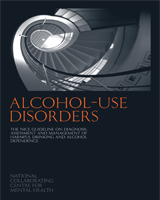Bischof et al., 2008
(Germany) | RCT | Stepped care
Full care
Untreated control group | Grams of alcohol per day at follow-up | Grams of alcohol per day (mean [SD]):
Control group:
Overall:
41.0 (50.3)
Stepped care: 46.9 (49.3)
Full care: 49.0 (41.3) | Full care: (n = 131)
Received computerised feedback. Received brief counselling sessions based on motivational interviewing and behavioural change counselling, each session 30 minutes.
Stepped care: (n = 138)
Computerised intervention and maximum of three brief counselling sessions at 1, 3 and 6 months after baseline. 30 to 40 minutes each.
If a participant within the stepped-care group reported a reduction of alcohol consumption below the study criteria for at-risk drinking and binge drinking within the last 3 weeks, and also indicated a high self-efficacy to keep the acquired behavioural change up, the intervention was discontinued and no further contact made until 12-month follow-up.
Control: (n = 139) Received a booklet on health behaviour. | No significant differences except when split by severity, where at-risk drinkers were significantly different from the control group on difference in grams alcohol per day baseline to follow-up (Mann–Whitney U test, p = 0.002) and binge criteria at follow-up, Mann–Whitney U test, p = 0.039)
Ordinary least squares (OLS)-regression: no significant difference, overall, (R2 change = 0.006, p = 0.124)
A significant difference for people at risk/who misuse alcohol (R2 change = 0.039, p = 0.036) but not for alcohol dependence (R2 change = 0.002, p = 0.511) or heavy episodic driving (R2 change = 0.000, p = 0.923) |
Breslin et al., 1999
(Canada) | RCT | Stepped-care approach (treatment non-responders assigned to three groups based on whether they were heavily drinking or not) | PDA DDD | Alcohol Dependence Scale score:
Range: 11.3–12.8 | Initial treatment: Four sessions of motivationally-based outpatient treatment. Treatment non-responders who consumed more than 12 drinks per week between assessment and third session were considered to be ‘drinking heavily during treatment’ an additional ‘step’, which consisted of additional readings, written exercises and a personalised progress report.
N = 67 responded to initial treatment
N = 33 received supplemental intervention
N = 36 did not respond to initial treatment | No significant differences between groups for PDA or DDD due to having a supplemental intervention.
Multivariate analysis of variance (MANOVA) indicated a significant effect of time for PDA, F (2116 = 35.89, p <0.0001, for all groups)
DDD F (2,115) = 26.91, p <0.0001. |
| Drummond et al., 2009 (UK) | RCT | Stepped-care intervention
Minimal intervention (Control) | Total alcohol consumed in 180 days
DDD | Total alcohol consumed in 180 days (mean [SD])
PDA Intervention: 1699.6 (194.8)
Control: 1423(113.3)
DDD Intervention: 15.2 (1.1)
Control: 12.9 (0.8)
PDA intervention: 37.9 (3.8)
Control: 36.6 (3.4) | Intervention: (n = 39)
Sequential series of interventions according to need/response.
Step 1: 40-minute session of behaviour-change counseling from a nurse with follow-up 28 days after initial session. Patients consumed >21 units of alcohol in any 1 week or 10 units per day were referred to Step 2.
Step2: Four 50-minute sessions of MET (trained alcohol counsellor); follow-up 28 days. If consumed same as in Step 1, referred to Step 3.
Step 3: Referral to local community alcohol team for specialist intervention. No limit on duration/intensity of treatment; where necessary, assisted withdrawal, inpatient treatment, outpatient counselling, relapse prevention and drug therapy given.
Control: (n = 52) 5-minute directive advice session from practice nurse addressing alcohol consumption reduction. Received self-help booklet. | Greater reduction in stepped-care group than control in total alcohol consumed (−408.6 g versus −238.8 g) and DDD (−2.4 versus −1.0), with an adjusted mean difference of 145.6 (95% CI-101.7 to 392.9) and 1.1 (−0.9 to 3.1) but not significant. |
